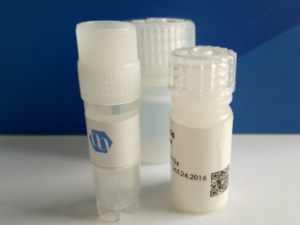$ 660.0
Quantity;1mg
In stock
Description
Product name: Adrenomedullin
Catalog#: 1237001
Organism: Human
Synonyms: AM,ADM,Human adrenomedullin, Adrenomedullin (human), Human adrenomedullin(1-52), Human adrenomedullin-(1-52)-NH2,YRQSMNNFQGLRSFGCRFGTCTVQKLAHQIYQFTDKDKDNVAPRSKISPQGY-amide,
CAS NO.: 148498-78-6
Sequence: Tyr-Arg-Gln-Ser-Met-Asn-Asn-Phe-Gln-Gly-Leu-Arg-Ser-Phe-Gly-Cys-Arg-Phe-Gly-Thr-Cys-Thr-Val-Gln-Lys-Leu-Ala-His-Gln-Ile-Tyr-Gln-Phe-Thr-Asp-Lys-Asp-Lys-Asp-Asn-Val-Ala-Pro-Arg-Ser-Lys-Ile-Ser-Pro-Gln-Gly-Tyr-NH2
Modifications: disulfide(16-21),c-terminal amide,
M.W: 6028.82
M.F.: C264H406N80O77S3
Purity: 95%
Counter ion: Trifluoacetate
Format: Lyophilized powder
Description: Adrenomedullin (ADM) is a 52-amino acid multifunctional peptide, which belongs to the calcitonin gene-related peptide (CGRP) superfamily of vasoactive peptide hormones. ADM exhibits a significant vasodilatory potential and plays a key role in various regulatory mechanisms, predominantly in the cardiovascular and lymphatic system. It exerts its effects by activation of the calcitonin receptor-like receptor associated with one of the receptor activity-modifying proteins 2 or 3. ADM was first isolated from human phaeochromocytoma in 1993. Numerous studies revealed a widespread distribution in various tissues and organs, which is reflected by its multiple physiological roles in health and disease. Because of its anti-inflammatory, anti-apoptotic and proliferative properties, ADM exhibits potent protective functions under diverse pathological conditions, but it is also critically involved in tumor progression. ADM has therefore raised great interest in therapeutic applications and several clinical trials already revealed promising results.
Uniprot ID: P35318
Usage: For Scientific Research Use Only, Not for Human Use.

